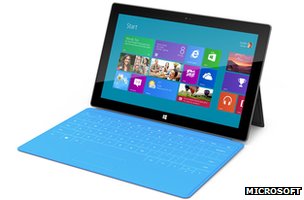Microsoft has revealed that Windows 8 will be released on 26 October.

The declaration was made at the firm’s annual sales meeting and was published on its blog shortly after.
The firm has described the update as the most important redesign of its interface in more than a decade.
The announcement was made a day before the firm releases its fourth quarter earnings report. Analysts say it may post its first ever loss after writing down the value of a troubled takeover.
The firm paid $6.3bn (£4bn) for the online advertising service Aquantive in 2007 but has said the service did not perform as expected. As a result its earnings will be offset by a $6.2bn charge.
Touchscreen controls
The company’s future efforts are now focused on its upcoming system software release.
Windows 8 includes a touch-controlled interface dubbed Metro as well as a more traditional desktop.
It will be released in a version that runs on ARM-based chips for the first time, as well as versions for x86-based ones designed by Intel and AMD.
Some consumers will have delayed buying new computers ahead of the release, depressing Microsoft’s sales in the meantime.
However, many companies have continued with their roll-out of Windows 7 as it typically takes big firms’ IT departments months or years after a major system update to approve its installation on workers’ computers.
Surface tablets
Part of Microsoft’s goal in the initial months will be to eat into sales of rivals’ tablet computers.
Apple’s iPad and Amazon’s Kindle Fire have dominated the sector while Google’s new Nexus 7 has also attracted positive reviews.
Microsoft hopes to make the most of the fact that it can offer a single system that can power both desktop PCs and mobile devices – allowing progams to work on both – as opposed to Apple’s decision to offer different Mac OS X and iPad iOS systems.
Microsoft has also taken the out-of-character step of announcing its own hardware – the Surface family of tablets – to compete with other companies’ products on the Windows 8 platform to maximise its chances.
But since announcing the news chief executive Steve Ballmer has sought to reassure his company’s hardware partners, describing Surface as “a design point” that would have a place within a “broad Windows ecosystem”.
Whatever the case, investors appear hopeful despite the problems with Aquantive.
“Microsoft’s stock is up 17% since the start of the year in part because of anticipation for Windows 8 and Surface,” said Colin Gillis, senior technology analyst at BGC Partners.
“We’re also still seeing nearly one million PCs sold worldwide a day so that’s a sizeable marketplace for them.”





